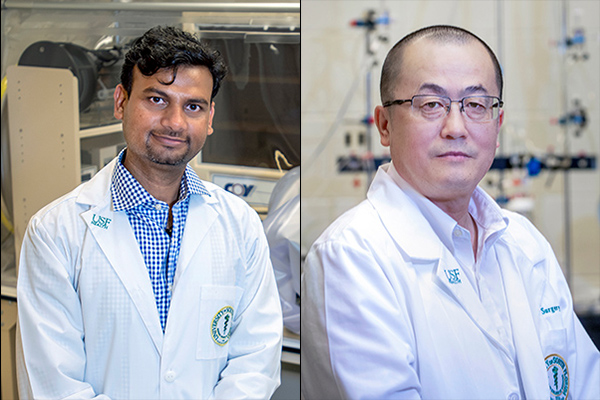
Hariom Yadav, PhD, of the USF Center for Microbiome Research, and Ji Li, PhD, of the USF Health Heart Institute — Photos by Allison Long, USF Health Communications
Two researchers from the USF Health Morsani College of Medicine have received Florida Department of Health (FDOH) grants to help advance discoveries in Alzheimer’s disease and in tobacco-related heart disease.
Hariom Yadav, PhD, an associate professor of neurosurgery and brain repair and director of the USF Center for Microbiome Research, was awarded total expected funds of $743,661 over four years from the FDOH Ed and Ethel Moore Alzheimer’s Disease Research Program. The multidisciplinary consortium project is titled “Role of Microbiome in the Aging of Gut and Brain in Floridian Older Adults.”
Researchers at USF and several other sites across Florida will study how diet affects the gut and oral microbiomes linked to brain health in adults ages 60 and older. Age is a key risk factor for Alzheimer’s disease and related dementias (ADRD); no effective treatment exists, and early risk detection remains a challenge. The FDOH-supported research seeks to determine whether unique microbiome signatures can differentiate older adults suffering cognitive decline and ADRD from their healthy counterparts and predict disease progression. The study will also examine whether abnormalities in microbe-derived metabolites, excessive gut “leakiness” and inflammation definitively contribute to cognitive impairment and ADRD—with the ultimate aim of identifying measures to prevent or delay these devastating conditions.
Ji Li, PhD, professor of surgery and a member of the USF Health Heart Institute, was awarded total expected funds of $583,200 over three years from the FDOH James and Esther King Biomedical Research Program. The grant is titled “Sirtuin 1 and Cardiovascular Impairment by Cigarette Smoking.”
Dr. Li’s laboratory has shown that the anti-aging protein sirtuin 1 (SIRT1) plays a role in cardiovascular disease development, and emerging evidence suggests that SIRT1 is a component of signaling pathways that allow cells to sense and react to cigarette smoking. The FDOH-supported preclinical project will test whether and how SIRT1 signaling helps control the harmful effects of cigarette smoking on the heart’s pumping function in hypertension (abnormally high blood pressure). The study’s outcome could lead to the discovery of SIRT1 agonists or other drugs that may reduce damage and death from hypertensive heart disease associated with chronic smoking.
